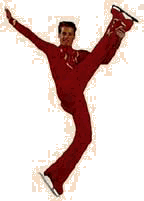 |
by Peter von Stackelberg |
The toilet bowl gave it away.
It was tastefully placed on one side of the living room, of course, and used as a planter. A pair of aborigine spears... the genuine article from Australia... poke through the greenery, a memento of a recent trip Down Under. It is the toilet bowl that tells you this is the home of a young man just moving out on his own.
It could be the home of any university student. But university is not in Browning's plans, at least not for now. He left home at 16 to pursue another goal. That was six years ago, years of full time work. For two years he crammed in high school classes. He tried holding down a part time job but couldn't handle the pace. His social life was non-existent. He had a girlfriend, but the relationship didn't last because of the effort put into pursuing his goal.
It will be another four years before Browning, and the world, gets to see whether the gold medal in the 1992 Olympics for men's figure skating will find its way around Kurt Browning's neck.
There are many who believe he can do it, that he'll take the place of Brian Orser, Canada's top male figure skater and a national hero because of his performance at the Calgary Olympics. At 22, Browning is already one of Canada's top skaters. This year he took third place in freeskating in the world. Much, much more is expected for him.
There's a lot of pressure when the expectations are that high.
"The comments about heir apparent have been haunting me," Browning says. "There are only so many skaters like Brian Orser. Nobody is going to just step into his shoes."
|
Browning has come a long way from the days of lashing on a pair of skates so he could improve his hockey skills. Spending winter months on the ice was a natural thing to do in his hometown of Caroline, AB. |
 |
There was no real turning point, no pivotal moment when he realized he wanted to be a world champion figure skater. He started winning local, then provincial competitions. His coach and his parents recognized his potential. They encouraged him to stay with it. At age 16 he moved to Edmonton, leaving his parents behind and living for a time with an older brother. It was a tough transition.
"The first five or six months were scary. I went from a high school of 200 to one with 1700," he says. "The school had three times the school population of Caroline. Most of the things I took for granted were gone... being able to talk to people you knew. Back home, I even knew their dogs."
Time spent on the ice cut heavily into his day... making life a constant round of school work, skating practice, and for a while, working as a waiter.
"I had absolutely no social life. I wasn't helping myself trying to do all this," he says, and the expression on his face and tremor in his voice made it clear this was a difficult time.
"I had long talks with my parents and my coach. My coach told me I had the talent and an opportunity that not too many people have. He said my parents were willing to make the financial sacrifice."
When he became a carded athlete at age 20, he gained the financial independence with a monthly allowance of $450 from the federal government given to promising amateur athletes.
"As long as I keep skating well, the money will be there to pay the bills," says Browning.
Skating well is what it all comes down to. Everyone expects it of him and that is where the pressure can build. "Everyone said I'd be on the Olympic team. They took it for granted. The worst kind of pressure is when people just expect you to perform perfectly," Browning says.
Learning to deal with pressure was essential. He does it by not letting the expectations of others rattle him.
"The expectations I put on myself come first," Browning says. "If others match, that's okay."
Another key element to surviving pressure is self-confidence. "When you get down on yourself, it's hard to deal with the pressure," he says. The time leading up to the Olympics was great tension.
"I'd be watching TV and the Olympics would be mentioned and my roommate would watch me cringe. I guess the more you wait the more time you have to doubt yourself. I tried not to think about it.
"You don't lose the competition on ice. You lose it before you get out there. It's much more mental than you realize. To skate out on the ice and do well, you have to have confidence in yourself, 110 per cent confidence."
Goal setting for Browning is constant and he says it's always easy to set the short term goals. To achieve them takes talent, the right opportunities, and plenty of plain hard work.
©1999 TG Magazine/Le Magazine TG
tgmag@tgmag.ca